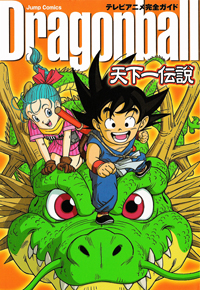Translations Archive
TV Anime Guide: Dragon Ball Tenka’ichi Densetsu

Piccolo Daimaō / God…as voiced by…Takeshi Aono
The instant I saw this green character, I was ready and raring to go. (Aono)
What was your first impression on seeing Piccolo Daimaō?
How should I put this… it was a “weird” feeling. He’s green, and he’s got this imposing face; the impact of his appearance was intense, so my impression was “eccentric”. Since I was young, I had had a lot of eccentric roles (laughs), so I thought perhaps that was the reason why the role of Piccolo Daimaō went to me. Because of that, the moment I saw this green character, I welled up with the desire to express him, thinking “well, how shall I portray him?”; I was ready and raring to go. (laughs) Piccolo Daimaō has the role of a great evil who stands in Goku’s way, but I played him not just with the typical villain’s deep voice, but also a high voice as though he’s suddenly exploded with emotion, so I felt that I was able to bring out his intensity.
The elderly Piccolo Daimaō becomes young again in the middle of the story; how did you go about distinguishing your performance?
My image of Piccolo Daimaō after he regained his youth is that “the range of emotion in his eccentric side was greater”. I raised the tone of both his lines and his voice, and through that, I tried to bring out his youth. Villains really are interesting.
You also played God, who looks identical to Piccolo Daimaō, yet has the opposite position.
God is not eccentric; he’s a character who’s always calm, so I was at a bit of a loss. I gave him an ordinary tone of voice, so it was easy to play him, but maybe I felt that it was a bit lacking? Really, characters with intense changes of emotion and whose tone of voice varies a lot require more energy, but they’re more fun to play.
In playing Piccolo Daimaō and God, were there any scenes that left an impression on you?
I just love that scene where Piccolo Daimaō lays an egg from his mouth and leaves a part of himself behind before he dies. It’s a part where the “inhuman” aspect of Piccolo Daimaō’s character is clearly shown, so it’s unforgettable even to me. At that time, I was performing seriously right from the test recording, so I was drenched in sweat, and felt like I myself was about to vomit something up. (laughs) I used a considerable amount of energy in that scene, and got not just into the form but into the role itself; I truly performed feeling as though I were giving birth to a child.
What sort of atmosphere was there in the recording studio at the time?
All the cast members were on harmonious terms, but when it came time to do it, it felt like they got straight into things. Starting with Nozawa-san, there was just the right level of tension.
How was it trading lines with Masako Nozawa-san, who played Goku?
It was easy to perform. I’d bounce back lines so as not to lose to Nozawa-san’s energy level, so the performances would be able to mesh.
What do you mean, the performances would be able to mesh?
The idea of the performances meshing is, not talking about this or that thing technique-wise, but rather, about the feelings the actors have put into their performances. It means, when the actor opposite you puts feeling into their performance and throws it your way, you’re also able to put feeling into your own performance in response to that. That back-and-forth of feeling is what I mean by the performances meshing, and I believe that performances where that happens can move the people watching, as well. When the performances don’t mesh, it also doesn’t convey that to the people watching. I believe that this “feeling” aspect that we actors have is the true pleasure of performing.
(Recorded 7 May 2004)
English Translation: Julian